Peter MALONE
Saturday, 09 October 2021 13:00
Guns Akimbo
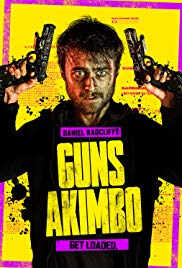
GUNS AKIMBO
New Zealand, UK, Germany, 2019, 92 minutes, Colour.
Daniel Radcliffe, Samara Weaving, Ned Dennehy, Natasha Liu Bordizzo, Grant Bowler.
Directed by Jason Lei Howden.
You don’t see the word akimbo in a film title every day – nor every year. In fact, in this violent action drama, guns are akimbo all the time. However, this relates especially to the central character, re Miles (Daniel Radcliffe), a rather nerdish type who is attacked by a media vigilante group and guns abrutally fixed to his wrists so that in all his actions, his hands are guns akimbo.
This is a film about social media reality shows. They are presented as grim, humans relentlessly pursuing humans, competitions, bets made, the number of on-line hits and likes ever-increasing. From that perspective, guns akimbo is critical of such programs let alone the reality of the hunts in real life.
From another perspective, the film is actually relishing in presenting ever-mounting violence. It is something of a situation, as with many such films, of the having one’s cake and eating it syndrome.
The film was made by New Zealand director, Jason Lei Howden, is set in a contemporary city that looks more American than any New Zealand city. And, Daniel Radcliffe performs with a New Zealand accent. But, there are some supporting characters, especially a genial drug addict in the streets, who definitely speaks with a local tone.
Miles works in an office, is the victim of jokes from the boss, a quiet nerd (a nerdish derivative, one might say, of Harry Potter). He is knowledgeable computer games, and tunes into the particular program where assassins pursue their victims, Skism.
The leader of the program, a former prisoner, shaved head, gaunt, continually sinister, is in charge of the logistics. On the one hand, he is absolutely brutal, murderous in intent. On the other, he has his driving ambition for the best online program, cameras, equipment, drones, angles for pursuit…
The film builds up to a final chase, a young assassin released from jail, played by Samara Weaving, intense, angry, set up to pursue Radcliffe.
Obviously, there are lots of comic moments as Radcliffe tries to do ordinary things but with his hands tied to the akimbo guns – how can he dress? How can he eat? And if he goes out in public how will the public respond, what will the police make of his guns…? He does get some help and encouragement from the genial drug addict who has been mentioned.
The effect of the pursuit, the dangers, the continued threats, the drones, have an effect on Miles so that he becomes something of a radicalised shooter himself. He encounters the young woman many times – but, fortunately, there are some plot twists, especially about her father, that bring them together.
In the meantime, we are shown so many of the fans, old and young, mainly male, all happily watching and cheering, many of them even salivating about the violence.
This is a film for those who enjoy the variations on the old Most Dangerous Game narrative, human pursuit. Others may find it too much even if they identify with the criticisms of this kind of reality social media.
Published in Movie Reviews
Published in
Movie Reviews
Saturday, 09 October 2021 13:00
Luce
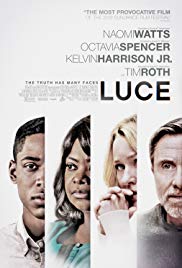
LUCE
US, 2019, 109 minutes, Colour.
Kelvin Harrison Jr, Naomi Watts, Octavia Spencer, Tim Roth, Norbert Leo Butz, Marsha Stephanie Blake.
Directed by Julius Onah.
Luce is an unexpected film. It is the story of an now-teenager who grew up in war-torn Eritrea, a child soldier, adopted by an American couple and brought to the United States where he excels in sports, in studies, in debates. He seems to be an ideal young man in a loving family and benefiting from American education. He states he is fully committed to the United States.
Kelvin Harrison Jr gives a very sympathetic performance as Luce – which makes the ambiguity of the ending even more ambiguous and disturbing. Harrison was a lead in Waves and also appeared in Dark Waters.
Naomi Watts and Tim Roth are the parents, she idealistic, the couple deciding not to have their own children, he fascinated by children and obviously wanting children of his own. They are placed in very difficult circumstances when one of Luce’s significant teachers, Octavia Spencer, reports odd and bad behaviour. The drama traces their sympathies, their suspicions, their arguments, their confrontations.
For the most part of the film, Luce is a very genial and conscientious character, good at his running, making student speeches, practising his debating techniques. But then, there is the issue of a young student, his relationship with her, his mother contacting her, the teacher also confronting her. Then, the teacher becomes a victim, being bad-mouthed, her trying to deal with her mentally disturbed sister, her house then painted with graffiti.
Which means then that the audience is challenged to ask about Luce and to see whether he is the ideal young American man or whether he is a pathological liar.
1. The title? The focus on Luce? The performance? His background in Eritrea, a child soldier and the violence? His adoption by Amy and Peter? The effect? The need for therapy? At school, his skill in running, in the debates, his speech? Success, charm, his prospects?
2. The town, the school, homes, the countryside and running? The American town? The musical score?
3. Luce and his initial impression, his speech? The doubts? Miss Wilson, the evidence, his locker, the fireworks, his writing the essay taking on the character of the subversive and violent speaker? Miss Wilson calling his mother, the talk, her hiding the fireworks and the essay? The discussions with Peter? Indications of Miss Wilson as a bitch? Luce’s charm, strength? His friend, Miss Wilson responsible for finding the drugs, expelling him, losing his scholarship? Issues of anger? Kim, her behaviour at the party, her being cold to Luce and vice versa?
4. Miss Wilson, teaching, African- American, knowledge of history? At home, her constant care for her sister, Rose’s behaviour, erratic, at the supermarket and the encounter with Luce? Setting the essay, her disappointment with Luce? Summoning Amy? The parents going to the principal, her credibility? The issue of her stereotyping people and setting of expectations? Downsizing them?
5. Amy and Peter, no children of their own, Peter and his love and seen with babies? The decision for adoption? The choice of Luce, change of name, their love for him, their self-sacrifice? Is Therapy? Meeting Miss Wilson, believing her are not? Reading the essay? Suspicions of Luce? The arguments between the parents, their stances? The rational response, the emotional response, the response of the school principal?
6. Luce at home, devoted, domestic life? His enthusiasm in going to the US? His speech, preparing and rehearsing his personal speech? His leaving early for running and debate work?
7. Kim, her story, with Miss Wilson and Miss Wilson’s accusations? Amy going to talk with her? The texts about her? Her informing Luce? Miss Wilson and Kim, the humiliation, getting the confession, Miss Wilson wanting to use it against Luce?
8. Luce, the paper, the intentions and themes, in theory, in action?
9. Amy, following Luce, observing the sexual encounter with Amy? Luce and his story?
10. His practising his speech, giving the speech, the acclaim?
11. The Internet with Rose, at school, her stripping, mad behaviour, everyone taking photos? The response of the principal? Miss Wilson on leave? The graffiti and her house? Her assuming that it was Luce or his friends?
12. Luce coming with the flowers, Miss Wilson rejecting him?
13. The successfully speech? The bonding with his parents?
14. The audience left with the question whether he was a charming hero or a pathological liar?
Published in Movie Reviews
Published in
Movie Reviews
Saturday, 09 October 2021 13:00
Driven/2019
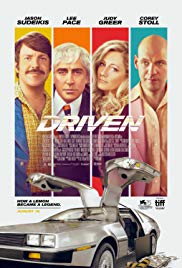
DRIVEN
US, 2019, 113 minutes, Colour.
Jason Sudeikis, Lee Pace, Judy Greer, Isabel Arraiza, Michael Cudlitz, Erin Moriarty, Jamey Sheridan, Iddo Goldberg, Tara Summers, Justin Bartha, Corey Stoll.
Directed by Nick Hamm.
While John De Lorean is a central character in this film, the focus is more on the conman, Jim Hoffman, who is befriended by De Lorean, becomes instrumental in helping him with a drug dealing solution to his financial problems, betrays him to the police but is ambiguous in his answers in the court and so, ultimately, helps De Lorean to freedom.
Some audiences were very critical of the film. The criticism seemed to indicate that they were expecting a biography of a car inventor and manufacturer like Tucker, the Man and his Dreams. While there are some insights into the character of John De Lorean, his mythmaking in his own mind leading to his ambitions and inventions, his ultimate decisions and involvement in the drug running, he is the subordinate character to Jim Hoffman.
Lee Pace is very effective as De Lorean. Jason Sudeikis is also very effective as Hoffman. Judy Greer appears as his wife. Corey Stoll is the FBI agent, determined to arrest DeLorean?, using Hoffman and ultimately frustrated.
It means that the early part of the film shows Hoffman as a pilot, bringing drugs from Colombia to the United States, arrested by the FBI, willing to be bait for De Lorean, set up in a luxury house, finding himself accepted by De Lorean and going to parties. However, in the past, he has absconded with some of the money from the drug dealing organiser and offers to pay back his debt by introducing him to DeLorean? and using him for the drug deal.
The film opens with Hoffman in the witness seat in a court case, so arresting audience attention, and then finishes with him and how he behaved, the effect for De Lorean, the frustration of the FBI agent.
1. The period, the 1970s, 1980s? Costumes and decor? Cars and vehicles? The De Lorean?
2. The court framework, Jim Hoffman in court, the prosecutor and the attack, Hoffman’s response, joking, evading? The resumption at the end?
3. Cocaine smuggling, Bolivia, the planes and the drugs, the pilots? The contrast with homes? FBI offices? The De Lorean mansion? The musical score?
4. The film as Jim Hoffman’s story, not that of John De Lorean? Different audience expectations?
5. Jason Sudeikis as Jim Hoffman, the conman, the deals, crime, money? His family, love for his wife? Her spoilt life? Children? The contact for Bolivia, the drug boss? Taken by the FBI, his betraying the drug boss? The FBI agent, the links? His new house, lifestyle, his ability to fix cars, the meeting with John De Lorean, the developing friendship, De Lorean’s dreams, Jim helping, invitation to his home, the friendship bond? Socialising?
6. The FBI agent, the interrogations, keeping contact, the meetings, the threats to imprisonment for Jim’s wife, the deals, trying to get the crime boss? His presence, his girlfriend? The meetings with Jim, the plausibility of his deals? The contact with De Lorean? Going to the party, the girlfriend with the wife stresses, drunk, in the pool, Jim rescuing her? The De Lorean disdain?
7. Phone calls, meetings, and, her wondering about what was happening, demanding the truth? The FBI’s threats? Her upset, leaving? Her love, return, sharing?
8. John De Lorean, in himself, the stories of his harsh father, the myth about his assembling the parts of the car? His ambitions, plans, the design of the car, distinctive, the need for money? His personal fortune? Jim giving ideas, the setting up of the company in Ireland? The product, the cars looking the same, faults in the initial cars? The threats to the company? Bill and the range of advisors, their loyalty? Meeting and concern about bankruptcy?
9. De Lorean scheme, the drugs, needing immediate money, the discussions with Jim? The connections? The FBI disguise? Setting up the crime? The meetings? The drug boss and his acceptance?
10. The plan, the range of drugs, the money, the delivery?
11. The setup, the sting, the tensions, De Lorean and his involvement, Jim driving him, trying to warn him? De Lorean giving Jim the money?
12. De Lorean’s wife, suspicions, visiting Alan? Trying to make the call?
13. The moment, the sting, the FBI agents, the arrest?
14. The interrogations? Jim and his response? In the court, the prosecutor, Jim evading answers? De Lorean free? The FBI agent and his disgust?
15. Not getting the money as planned from the FBI, going into witness protection?
16. The final information about De Lorean and Jim Hoffman?
Published in Movie Reviews
Published in
Movie Reviews
Saturday, 09 October 2021 13:00
Escape and Evasion
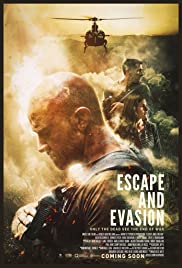
ESCAPE AND EVASION
Australia, 2019, 92 minutes, Colour.
Josh Mc Conville, Rena Owen, Hugh Sheridan, Juwan Sykes, Bonnie Sveen, Steve Le Marquand, Firass Dirani, Jessi Robertson,
Directed by Storm Ashwood.
A rather challenging title.
This film is topical in many ways. While the main setting is the Gold Coast and suburbia, the many action sequences (filmed in Queensland) are situated in Myanmar. An Australian Special Ops Squad is sent to track down a renegade officer, which brings them into contact with Rohingya refugees, the military forces, massacres of the locals, military arrests and torture. This serves as a significant reminder to audiences, and Australian audiences, of the persecution of the Rohingya and the migrations of hundreds of thousands to Bangladesh.
The film is even more topical with its presentation of PTSD – with an appeal before the final credits for more services to the military who have served but have experienced so much trauma. The experience of the special squad, a strictly secret mission, violent conflict with the local military, seeing the massacre of helpless, arrest and harsh torture, is shown graphically and enables the audience to understand and appreciate the trauma.
The focus of the story is on the leader of the squad, Seth (Josh Mc Conville) who has been brought back to Australia in a severe state of depression, moments of hallucination, terrifying dreams. His liaison officer (Rena Owen) is military demanding, reminding him that the Army did not train members to be losers. We first see this officer arriving at a house delivering one of those letters concerning death. The recipient is Rebecca (Bonnie Sveen) the twin sister of one of the men in the squad. She is also a journalist, has visited Myanmar, confronts Seth.
She is angry, demanding answers. He is in the middle of his trauma, being advised to seek psychological help, shunned by his angry wife, trying to establish a relationship with his young daughter.
Gradually, the nature of the mission, the experience, is revealed to Rebecca and to the audience. She still has demands to know the truth about her brother who is listed as missing in action.
As we watch the story of the mission, the squad sent secretly to track down a renegade officer who has become involved in drug dealing in the area as well as a great deal of violence, we may be reminded of the core basic plot of Joseph Conrad’s Heart of Darkness which was at the centre of Coppola’s Apocalypse Now.
The post-traumatic stress experiences of Seth are severe and demanding – and have something of this kind of effect on the audience, forced to participate in the trauma, watching, puzzling, feeling, even tormented.
This is the second feature of the writer-director, Storm Ashwood (his previous film being the horror story, The School). It is an effective feature – and we can look forward to his further films probing contemporary issues.
1. The title? The action in Myanmar? Filmed in the Gold Coast? The range of escapes, for Seth and his experience? The evasion is in not telling the truth?
2. The Queensland settings for the Myanmar jungle? Action on the Gold Coast? The musical score?
3. The film’s message about PTSD? Seth’s experience, the mission, to find the rogue soldier, the encounter with the Rohingya, the military and the deaths, the boys and the shooting of the boy, his own men, the tensions? Escaping, being arrested, the torture, with Josh? His escape from the pit, returning home? The aftermath, dreams, hallucinations, the need for psychological treatment? The consequences for his wife and daughter? The encounters with Rebecca and being forced to go back to the truth? The officer and her demands, military not been trained to be losers?
4. The echoes of Apocalypse Now, the jungle, seeking out the rogue soldier? His drug dealing, with the locals? Taking of Seth and his men? Challenges, the motivation for his turning rogue? The torture? Seth escaping, telling him?
5. Seth and his wife, the tension, her wanting to move to Melbourne, his bond with his daughter, the outings? Yet his hallucinations and her being disturbed? The final reconciliation?
6. Rebecca, the officer coming to the house with the message? Josh’s death, her twin brother? The bond? Her being a reporter, visiting Myanmar? Challenging the officer?
7. The discussions with Seth, trying to find out the truth, dealing with him, gradually the truth being told, the effect on her? A final reconciliation?
8. Josh, his background, the abusive father, his sense of guilt, in the war, in action, tortured, helping Seth escape, his death, self-sacrifice?
9. The background of the Rohingya, the refugees, the brutal military, the tension with military and the Australian soldiers, shooting the boy? The other boy helping Seth with his escape?
10. Seth, reliving the experiences, talking with Rebecca, the final exorcism, the vision of the soldiers in the Rohingya boys coming to him and leaving?
Published in Movie Reviews
Published in
Movie Reviews
Saturday, 09 October 2021 13:00
Belle Epoque, La

LA BELLE EPOQUE
France, 2019, 112 minutes, Colour.
Daniel Auteuil, Fanny Ardant, Guillaume Canet, Doris Tillier, Pierre Arditi.
Directed by Nicolas Bedos.
This seems a rather grandiose title – and, it is misleading. The period referred generally to with this title extends from the end of the Franco-Prussian? War, 1871, to the outbreak of World War II, 1914. A beautiful era for France.
In fact, this film has a contemporary setting, very much the 21st-century. It does, however, begin with a sequence that looks like that beautiful Epoque. Costumed guests sit around the dinner table, talking, uttering racist statements, and guest with a roving gay eye on a black waiter – and a sudden violent eruption.
It is not a spoiler to say that this is a contrived sequence, the work of a company, headed by an entrepreneur (Guillaume Canet) who have their own studios, production offices, a large group of aspiring actors to draw on, re-creating scenes from the past. Their business is to have clients who provide them with information, desires and hopes, so the particular period of their life can be staged and they can be involved in it. It seems something like a reverse experience of The Truman Show, Truman living his life under the cameras, in studio setups, and the director intervening in his life as Truman discovers it. This time the director is hired, creates the situation, gives the cast storylines that they have to develop, so that the client can go back and rediscover the past and what it had meant.
This is quite an ingenious idea for the screenplay – and, we the audience, willingly share the experience with the client, share the experience in the present with its regrets, participate in the experience of the past, looking forward to some outcomes for the better.
Daniel Auteuil and Fanny Ardant (Victor and Marianne) play a couple who have been married for over 40 years. He has lost his job, a sketch artist, and is depressed, railing against younger generations and the dependence on technology and social media. She is a strong-minded woman, disappointed in her husband, in her marriage, seeking solace elsewhere. Their son is a good friend of the producer-directir and offers his father the opportunity to relive his past.
There is a fascination all the time in watching the director and his control, manipulation, the cast and their improvisations in developments of the storylines, glimpses of other stories and people coping with their past. There is also the complication that the young actress, Margot (Doris Tillier) taking the role of Victor’s wife, also becomes the object of fascination and attractive for Victor. But, she has the complications of her own life, especially in her relationship with Antwoine.
We uses to go back to 1974, to the restaurant where he first encountered Marianne. The recreation is meticulous, the characters bringing the past to life, Victor relishing his reliving of the experience.
Of course, the experience of going into the past, of living the happiness again and realising that the happiness had collapsed, could make for some grim introspection. And there are these moments. However, while the themes are serious, the screenplay is often quite funny (and the writer-director, Nicolas Bedos was born as late as 1980). This leads to an effect for both Victor and Marianne, rediscovering the hopes and love of the past, and that they need not necessarily be lost forever.
The film received a standing ovation at the Khan film Festival in 2019 – tres francais!
1. The title, the reference to the past Europe? For this film, whose Epoque?
2. The acclaim for the film, popularity?
3. The inventive screenplay, the parallels with such programs as The Truman Show, Westworld, Fantasy Island…? The use of film and television? Creating a life? Creating situation? The role and interventions of the director?
4. The opening, the banquet sequence, the 19th century, the guests, clothes, food, chatter, their snobbery, race issues, the gay man, accosting the waiter, his biting the lips? The discovery that this was a created scene, actors and scenario?
5. Antoine, his past as a child, his injury? Friendship with Victor’s son? His remembering Victor’s advice? The growing friendship with the son, his company, his studios, the cast, the scenarios, the range of clients, to return to their past, to go to a fabricated situation? The client supplying the information and cues? The assistance, the woman assistant and her role in the scenario? Antoine and his involvement with Margot, and the tension in Victor’s re-created life?
6. The introduction to Victor and Marianne, their age, the tension in their marriage, past love? Victor, his career, sketches, losing his job, anti-technology, nodding off, depressed? Marian and her style, her career, critical of her husband, the apartment, the clashes, his moving out?
7. Marianne, Victor’s friend, the office, the affair, his being at home, snoring, the deceit? Marianne discussing the situation with her son?
8. Victor, upset, moving out, moving into his friend’s place, his son and the invitation to revisit the past, his acceptance?
9. The appointment, giving the information, going back to 1974, his sketches, the contriving of the scene? The cast, the range, their stories, their interpretation? The decor of the restaurant the period? The role of the director, watching, guiding, interventions?
10. Margot, her Polish background, her place in the cast, wanting to keep her job? In herself, as Marianne? The friendship of Giselle and her entering into the story? Victor reliving his life, the range of scenarios? Margo, the scene with the baby and the husband? Contrived? The cast and their air piece earpieces?
11. Victor, the effect of reliving his life? The memories evoked, the regrets? His continuing?
12. Paul, the scenario with his father? As the concierge? Discussions with Victor? The drink on his day off?
13. Victor becoming involved, the attraction torture marker, the resistance, the discussion, his visit to the house?
14. Victor and Marianne meeting in 1974, their discussions about their life, the effect on each of them, the effect on Marianne, dropping her scarf? Victor and the rekindling of love?
15. Marianne, breaking off the affair? Bonding again with Victor? The future?
Published in Movie Reviews
Published in
Movie Reviews
Saturday, 09 October 2021 13:00
Corpus Christi
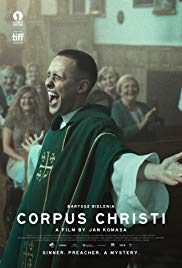
CORPUS CHRISTI
Poland, 2019, 115 minutes, Colour.
Bartosz Bielenia, Aleksandra Konieczna, Eliza Rycembel.
Directed by Jan Komasa.
Corpus Christi, the Latin for the body of Christ, has found a place in the English language, a city in Texas, a religious celebration, a reference to the celebration of the Eucharist. It is an apt title for this quite intriguing story of a Polish parish and the young priest, Daniel (Bartosz Bielenia) who serves some time ministering and having quite an effect on the parishioners.
But, we know right from the beginning, that he is not a priest.
There is a certain curiosity in wanting to see this film because it was one of the five nominees for the 2019 Oscars category of Best International Film (won by Korea’s Parasite). It seems a strange selection for the award and seems even stranger that it finished in the top nominees.
It will be of particular interest to Catholic audiences who might be intrigued as to the situation, the character of the young man, how he manages in the parish and the impact that he has on people. On the other hand, some Catholic audiences might be repelled at his character, his presumption in taking on the role of parish priest, think that it is somewhat sacrilegious. But, it is interesting, especially in terms of so much of the dialogue where everybody says “Blessed be God� in their frequent greetings to one another, and some homily reflections on the presence of God everywhere, especially in strange situations and circumstances.
Daniel has committed some violent crimes when young and is imprisoned in a juvenile detention centre, a Catholic Centre, with priests on the staff, including a chaplain. Daniel discusses a desire to enter a seminary with the chaplain but is told that with his convictions he has no chance. And, as we see some of the behaviour of the inmates, cocaine, drinking, sexual activity, some brutality towards each other, we are not surprised. However, it is Daniel who prepares the altar for Mass, does the serving, intones the hymn singing.
Sent on parole to a sawmill in a remote town, he wants to avoid the mill, goes into the church, encounters a young woman, says he is a priest and shows her the black shirt and clerical collar that he has taken from the institution.
He meets the local parish priest, an elderly and sick man who is taken to hospital – and the people ask Daniel to hear the confessions, say Mass.
One of the features of this film is that it is not anticlerical. It takes for granted the church, Mass, sacraments, anointing of the sick, funerals, pastoral care of people, and it is accurate and respectful in most of its details.
One of the main questions, of course, is what is the reality of priesthood. Daniel has some non-exemplary moments, especially with the young girl in the parish, and is pressurised by one of his fellow inmates to hand over the parish collection. But, Daniel is imbued with a sense of reverence, all kinds of moving words and sentiments coming from him as homily, as encouragement for behaviour, his challenging the parishioners to overcome quite some bigotry concerning an accident in which a number of the teenagers from the village were killed. In fact, with some contemporary and eyebrow-raising detail, there is the temptation to remember the novel by Georges Bernanos and Robert Bresson’s film, Diary of a Country Priest.
Daniel is very young, his life ahead of him, and we wonder what impact this priestly episode will have on his future. But, for audiences who have responded favourably to the film, there is much to consider about God, prayer, sin and guilt, forgiveness, the role of the priest in the church. (It is interesting to speculate what would happen in a sequel…)
1. The title? The meanings? Catholic sensibility? Polish sensibility? The body of Christ? The liturgical celebration? In a contemporary setting?
2. The Oscar nomination? Polish awards? Tradition of films about clergy, Kler? The setting, contemporary, the institution for juvenile offenders, their workplace, the Chapel, life in the institution? Train travel? The village, the church, the countryside, the presbytery and houses, the roads? The musical score and the hymns?
3. The credibility of the plot, in general, the impersonating priest? Possible in Poland? A film about priests and their task, their ministry? Church organisation and the bishop? Daniel and his preparation, his behaviour as a priest? Believed?
4. Daniel, his age, background of crime? Interest in the Institute, the woodwork, turning his back on the abuse of the fellow prisoner, his helping him? In church, the priest, the discussion about going to the seminary, exclusion because of his convictions? Serving the Mass, intoning the hymns? His parole, the plan to go to the sawmill? On the train, the policeman seeing him and criticising him? Life in the institution – and the scenes of sexual encounter, cocaine, drinking, the students? Is wearing the clerical shirt, looking in the mirror?
5. His arrival, going to the church, the encounter with Eliza? Meeting Lydia? Meeting the parish priest, the discussions, his collapse and illness? Daniel and his staying, taking the collection, going to the supermarket? The priest in hospital?
6. Daniel asked to hear the confessions, the mother, criticising her son because of smoking, her sinfulness, his penance, the harsher cigarettes? An outing?
7. The effect, his decision to stay, request to celebrate Mass? His imitating the chaplain at the institution, his words, the question about going to church, God outside and everywhere? Prayer is not mechanical? The organ playing, the Marion picture exposed? The effect on him?
8. The background of the accident, the young people killed, the shrine in the road, the photos, the gatherings? The hostility towards the driver, towards his widow? The story, the scenes of the young people taking cocaine? The threats of the driver against them? The refusal to have the funeral in the town? The mayor and his visit to Daniel, wanting a deal? The widow and the box of hostile letters? Daniel and is collecting the toys and the mementos from the family? The discussion about the funeral, the payment? The fact of the funeral, the hostile mother joining the funeral procession? The effect on Daniel?
9. Lydia, looking out to the church, her severity, the death of her son? Control, the daughter and rebellion? A letter amongst the cash and letters? The doubts at the end?
10. The mayor, the deal with Daniel, getting him to bless the new wing, the feast of Corpus Christie? Daniela Greene, his kneeling on the ground, his prayer for denunciation?
11. Eliza, with the group, the meetings and discussions, Danielle at home with the young people? Eliza, the living in the presbytery, the sexual encounter? The request for Daniel’s ID and Eliza saying it was in the laundry? The arrival of his fellow inmates from the juvenile centre, confession, the blackmail, wanting the money?
12. The scene of Daniel anointing the elderly woman?
13. The arrival of the chaplain, his going to action, the arguments, offering to celebrate the Mass, Daniel stripping, saying that he was a sinner, leaving?
14. His return to the institution, the brutal fight? His future?
Published in Movie Reviews
Published in
Movie Reviews
Saturday, 09 October 2021 13:00
Citizen K
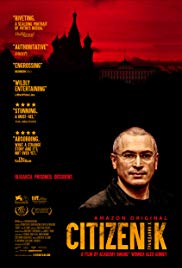
CITIZEN K
US, 2019, 126 minutes, Colour.
Directed by Alex Gibney.
The information: Directed by Alex Gibney, is certainly a strong recommendation to look at any film with his name attached. Since 2005 with his expose of the Enron executives, Enron: The Smartest Guys in the Room, he has directed over 40 documentaries, winning an Oscar for his examination of interrogation and torture in Afghanistan, Taxi to the Darkside, and examinations of lands Armstrong, a documentary about WikiLeaks?, clerical sexual abuse, Silence in the Church of God, Scientology…
Mikhail Khodorkovsky make not be a name on everybody’s lips (though from the evidence here, it is a name on millions of Russian lips). He was one of the famous Russian oligarchs of the 1990s, perhaps the most successful. He established a bank, developed an energy company, built up a fortune. But, he fell foul of Vladimir Putin, charges brought against him, sentences Siberia for nine years, and then more.
So, why is he the subject of Alex Gibney’s current documentary?
After his release from Siberia, part of the special amnesty extended by Putin at the time of the Olympic Winter games at Sochi in 2014, he was exiled from Russia and is currently based in London – and, something which many of us realise with stories about deaths of significant Russians in the UK, not necessarily a safe place for him. Ackley’s Alex Gibney did an extensive interview with him, quite a sympathetic interview, especially given his stances about contemporary Russia, about Vladimir Putin himself and his continued moves towards dictatorship, establishing an international movement “open Russia�.
Some commentators on the documentary think that Gibney was to favourable towards Cortical ski, acknowledging that many Russians think that he was responsible for the murder of a mayor in the late 1990s who confronted him about the energy company. And, there are the questions of how he made his money during the Yeltsin years – and, even with his years in prison, he is still a very wealthy man, but channelling much of his money into his Open Russia movement.
In his interview in London, he comes across very sympathetically, talking about having the courage of convictions and integrity in going to prison, the effect of the long years in his self-examination, his ambitions to be a better and contributing person.
With a great deal of footage, especially from television news, Gibney builds up the story of the collapse of the Soviet Union, the Yeltsin years, the emergence of Putin, the domination of the oligarchs, their being taken down, Yeltsin’s career as president, Prime Minister, Pres and the showcase of the 2018 elections (which she won!).
In fact, this film is also a portrait of Putin, a very critical portrait, with a great number of close-ups, excerpts from speeches, his use of television for self-promotion (the hunting, the bare chest fishing…). In fact, in the opening credits, there is a picture of the key players in this story and it uses the device in many feature films to highlight a significant member of the cast, “… And Vladimir Putin�). He also gets a credit for his rendition of blueberry Hill, not the greatest singer in Russia.
Which means that this is a film of great interest for those looking at the development of society and Russia over the last 30 years, the transition from Communism to Capitalism, with a reference to the behaviour of the oligarchs, cronies, Putin and those who surround him, as “gangster capitalism�.
These characters and events may not be foremost in the consciousness of many of the audience of this film – but, it is an excellent opportunity to experience the characters, reflect on what has happened – and where we are in the world, the Putin world and the East and the Trump world and the West.
Published in Movie Reviews
Published in
Movie Reviews
Saturday, 09 October 2021 13:00
Fantasy Island
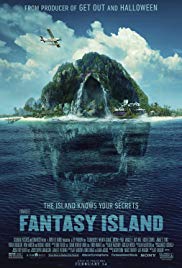
FANTASY ISLAND
US, 2020, 110 minutes, Colour.
Michael Peña, Lucy Hale, Austin Stowell, Jimmy O.Yang, Ryan Hansen, Maggie Q, Charlotte Mc Kinney, Evan Evagora, Portia Doubleday, Kim Coates, Michael Rooker Parisa Fitz- Henley.
Directed by Jeff Wadlow.
On hearing of Fantasy Island, some older audiences might be delighted. It was a favourite golden oldie television series making a comeback?. Well, not exactly!
In recent years the Blumhouse Company has been very successful in producing smaller budget horror stories, drawing on all kinds of conventions and eagerly exploiting them. Audience response, younger rather than older, has been very positive. Some of their films have been Truth or Dare, Happy Death Day, Us.
But what has happened here is that the basic idea, created by Gene Levitt in the 1970s into the 1980s, has been appropriated for an island where the fantasies lead not just to a self-revelation, but to some horror experiences.
Once upon a time, there was the Hispanic Ricardo Montalban as Mr Rourke. Now there is the Hispanic Michael Peña as the 21st-century Mr Rourke. At the beginning, he has an assistant, Julia, a woman of mystery. But, at the end, as he calls out “the plane, the plane�, there is a brand-new Tattoo!
As expected, there is a motley group of guests each on their own quest. There is Gwen (Maggie Q) who regrets she did not accept a marriage proposal five years earlier. There is the young and brash Melanie (Lucy Hale) who is still resentful about a school bully and wants to see some justice done. Patrick (Austin Stowell) is an upright character with military ambitions, remembering his hero father. And then there is a kind of brash 21st-century Abbott and Costello type of partnership, stepbrothers, one tall and very white American, the other short and Asian (Ryan Hansen and Jimmy O.Yang). The stepbrothers have a very easy fantasy, some indulgence in the kind of Spring Break cavortings, drinking, sex…
There is some further complications on the island, a private detective who has been sent to investigate what on earth is going on. There are also some mercenaries, in link with the drug dealer who previously owned the island. Clearly there are going to be threats, guns (and several grenades).
As the film goes on, as we might have expected, people start to enter into other people’s fantasies, pursued also by the baddies, so that the plot becomes, to say the least, overly-convoluted. One must agree with one reviewer who remarked that in the middle of the filmmaking, they tossed all the pages into the air and decided to film whatever landed first. Which rather undermines the credibility, especially the revelation of the final villain.
This is one of Blumhouse’s lesser efforts, a reasonable idea but there is that tangle of the convolution.
1. The Blumhouse company and its making of small budget horror films? Its success and reputation?
2. Television and Fantasy Island, memories of Ricardo Montalbano, Hispanic, Mr Rourke? Tattoo as his assistant? Calling out that the plane was arriving, the guests, meeting their fantasies – in a romantic holiday situation?
3. Turning this premise into horror?
4. The screenplay, the guest characters, filling in their backgrounds, delineating their fantasies, the various twists, entering into each other’s fantasies, realism and fantasy, dangers and violence, the life-giving power of the fountain in the cave? The final revelation of the villain – how plausible?
5. This talk, Michael Peña and his Hispanic presence, Julia as his assistant and welcoming? Mr Rourke and his explanations, immersion into the fantasies, following them through to the end? His own fantasy, the relationship with his wife?
6. The range of staff on the island? The plausibility of so many fantasies and the crowds acting them out? The private detective on the island and his interventions? The drug dealers in link with the previous owner and their invading the island?
7. Melanie’s story, young and brash, the revenge on the bullying student, going into the control room, her enemy bound and gagged, the doctor coming to torture her, the console, pressing the buttons, the various attacks? Her discovery that this was real, that Sloane had been abducted, her in fidelity to her husband, the phone call to the husband? Her rescuing Sloane, linking up with the others, going through the cave? The revelation that she was the villain? How plausible? Her fantasy and her place in other’s fantasies?
8. Sloane, the bully, her husband, infidelity, abducted, gagged and bound, the torture, rescued by Melanie, the apology? The escape together, the dangers in the cave? Her other self? And the revelation of the truth and her escape?
9. Patrick, the military image, memories of his father, the uniform, participating in the fantasies of his father’s last mission, going to Venezuela, the soldiers, his being captured, revealing himself to his father, their going into other people’s fantasies, the danger to Patrick, his father falling on the grenade? Patrick, helping the others, military interventions, his sacrificing himself?
10. Gwen, her fantasy, meeting her fiance, the same meal, five years earlier, the proposal, her acceptance? The discovery of her life, married for five years, her daughter? Her remembering the past, causing the fire, in the fire, her being rescued? Her daughter turning on her?
11. Brad and Bracks, half-brothers, the kind of spring break fantasy, Chastity, Bracks has gay, the men? Their becoming involved in the other fantasies? The dangers, Brad and his death? Bracks and some heroism?
12. The private detective, desperate, trying to help, the women, saving them, going over the cliff?
13. The mercenaries, their masks, uniforms, attack, the violence, the weapons? The guests defending themselves?
14. The confrontation with Mr Rourke, the truth? Julia dying?
15. Leaving the island, Mr Rourke staying, Bracks becoming Tattoo, saving Brad, the women on the plane going to safety?
Published in Movie Reviews
Published in
Movie Reviews
Saturday, 09 October 2021 13:00
Richard Jewell
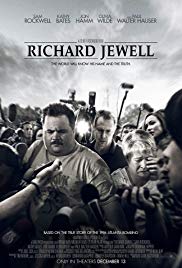
RICHARD JEWELL
US, 2019, 131 minutes, Colour.
Paul Walter Hauser, Sam Rockwell, Kathy Bates, Jon Hamm, Olivia Wilde.
Directed by Clint Eastwood.
Another interesting and moving film from Clint Eastwood. It was in production when he turned 89. And, it received worldwide release in 2020, half a century after he directed his first film, Play Misty for Me. He has had an extraordinary career as director and producer, a great number of fine films.
The main events in this film take place in 1996 which means that it will be less remembered by the new generations of Americans. And, the story is not well-known in countries outside the United States. However, it proved an interesting test case about FBI action and investigations. They have the wrong man.
Richard Jewell was an American in his 30s, rather large and overweight in build, living at home with his mother, completely devoted to law and order, a great admiration for law enforcement organisations. He was genial to meet – but he also took his various jobs in campus police work, security, extremely seriously. He was a hunter, a collector of guns. He had not paid his taxes for years. These things were all held against him when he was investigated, targeted, by the FBI. Most of the film is about his investigation, his work with his lawyer, Watson Bryant, response to the media and its intrusiveness, concern about the effect of the investigation and intrusion on his mother.
The first part of the film establishes him as a larger than life character. Paul Walter Hauser gives a strongly credible and creditable performance as Richard Jewell. We believe Paul Walter Hauser is Richard Jewell. Kathy Bates, Oscar nominated for this role, plays his mother. Sam Rockwell plays the lawyer who takes a shine to Richard and his small kindnesses and consideration. So, when Richard is charged by the FBI, he contacts Watson Bryant for his defence.
The central episode, also presented vividly, is a series of concerts in Centennial Gardens, Atlanta, Georgia, at the time of the 1996 Olympic Games. A bomb is placed under a bench. An anonymous phone call is made. Richard is part of the security group, discovering the bag, warning bystanders and others, helping in moving the crowds to safer positions, although many were wounded and two were killed when the bomb goes off.
He is immediately hailed as a hero, feted by the media, on shows like the Today Show. However, a campus administrator has let the FBI know about his past over-conscientiousness with students. Profilers then suggest that he fits perfectly the outsider, with ideas about himself, planting the bomb so that he can take all the credit for being the hero in the public eye. And this, reported in the local papers, took off so that Richard and his mother were hounded, their belongings transferred by the FBI, the FBI also pretending to Richard that they were making a training video and using this to cross-examine him.
We are all on side with Sam Rockwell as the lawyer, defending Richard, exasperated and his proneness to embroider all his responses with praise of authorities, confronting the FBI. Jon Hamm is the agent on duty at the time of the explosion, responding to the profile of Richard wanting to be hero, leaking information to a hard-as-enables reporter, Olivia Wilde. The audience is definitely not on side with the agent or the reporter.
The exoneration scene, where Richard does speak for himself confronting the agents, takes place 88 days after the investigation, a pressure on his life and he died of a heart attack in 2007 at the age of 44.
Very interesting piece of Americana, of ordinary characters, of the role of the authorities making mistakes, the pressure of the media, and its toll on the target and his mother.
1. A true story? A piece of Americana? A Clint Eastwood film?
2. Audience knowledge of Jewell himself? In the US? Outside the US?
3. The title, the focus on Jewell himself? Paul Walter Hauser embodying him? The Georgia background? His age and experience, his big build, love of eating? Living with his mother? His ambitions, law and order, uniform, weapons, authority, on the campus, his treatment of the students, the reaction, the campus director and the interview, firing him, the later testimony of the director? Variety of jobs? His personality?
4. His work in the office, the link with Watson, the supplies, the draws in the desk, the packet of Snickers? Computer games, competing with him? The nickname Radar? Richard and his willingness to help? Moving into security? Centennial Park? On guard?
5. The background of the 1996 Olympic Games, Atlanta, the concerts, the Knny Rogers’ concert, the crowds, Richard’s mother enjoying it? His work, the fellow security officers, the police? The young drinkers, calling in the police, the discovery of the bag? Going by the rules, caution, going to the tower for evacuations, the technicians examining the case, the bomb, the background of the phone call and warning, Richard and the group trying to move the evacuation? The explosion, injuries, two deaths?
6. Richard as hero, the ordinary viewer, on television, the Today Show? The book offer? His mother watching the TV, her pride?
7. Agent Shaw, on duty in the park, discontent, his feeling humiliated, the campus report, the profile theory, his pursuing of it, the board meetings and his determination, pretending to stage a case study with the video, interviewing Richard, questioning him, the other agents, getting Richard to voice the phone warning? Shaw and his link with Kate Scruggs?
8. Kate Scruggs, her work, hard journalist, the connection with Shaw, sexual? His giving the information, her using it, the arguments with the editors, the headlines, the result, cheers in the press office?
9. The media, influence, turning against Richard?
10. The FBI, taking possession of everything in the house, his mother being upset?
11. The phone call to Watson, about the book offer, from the interrogation? Nadia, the work for Watson, on side?
12. Watson, his response, visiting Richard, confronting the media, confronting the FBI? His tough stances? Warning Richard not to talk too much – but his incessant talk?
13. Testing the timing and finding it impossible for Richard to make the phone call? Kate Scruggs doing the same test?
14. Watson, submitting Richard to the lie detector, his passing?
15. The humiliation, the suspicions, 88 days passing, the summons to the FBI? Richard shrewd, following Watson’s advice? The meeting, formally dressed, Richard and his strong
stances in response to the questions? The challenge? His being let go?
16. The return of the goods, his mother coming down?
17. His later police job, Watson finding him, the news of the actual culprit?
18. America, law and order, the FBI, investigations, targeting suspects?
Published in Movie Reviews
Published in
Movie Reviews
Saturday, 09 October 2021 13:00
3 From Hell
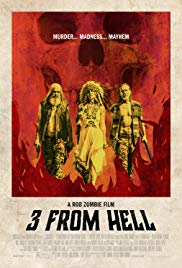
3 FROM HELL
US, 2019, 115 minutes, Colour.
Sheri Moon Zombie, Bill Moseley, Sid Haig, Richard Brake, Lucinda Jenny, Danny Trejo, Dee Wallace, Clint Howard, Daniel Roebuck, Richard Riehle. Narrated by Barry Bostwick.
Directed by Rob Zombie.
It is fairly safe to say that 3 From Hell is a film solely for those who are Rob Zombie film completists. They would include fans of gory horror, brutal violence, and violent amoral worlds.
This film is in continuation (with visual quotes) from his earlier films, House of 1000 Corpses, The Devil’s Rejects. The same central characters, self-absorbed, ugly, no moral compass in their lives. Sid Haig, a regular for Rob Zombie, appears early in the film but died in real life and his character then is imprisoned and executed. Bill Moseley and Sheri Moon Zombie are imprisoned, exercise their violence in prison, eventually are released and go on a mad violent rampage, killing at will, gleefully enjoying it, eventually confronting a drug lord – who is overcome, placed in a coffin, burnt alive. The escapees go joyfully on their way.
It is fair to say that these are three depraved characters presented with no redeeming features.
It is surprising to see a number of character actors from Hollywood in supporting roles.
Published in Movie Reviews
Published in
Movie Reviews